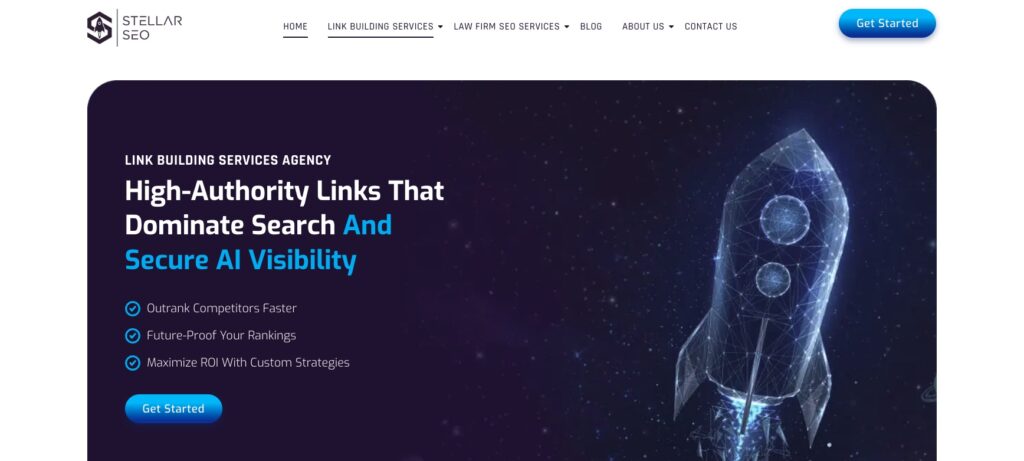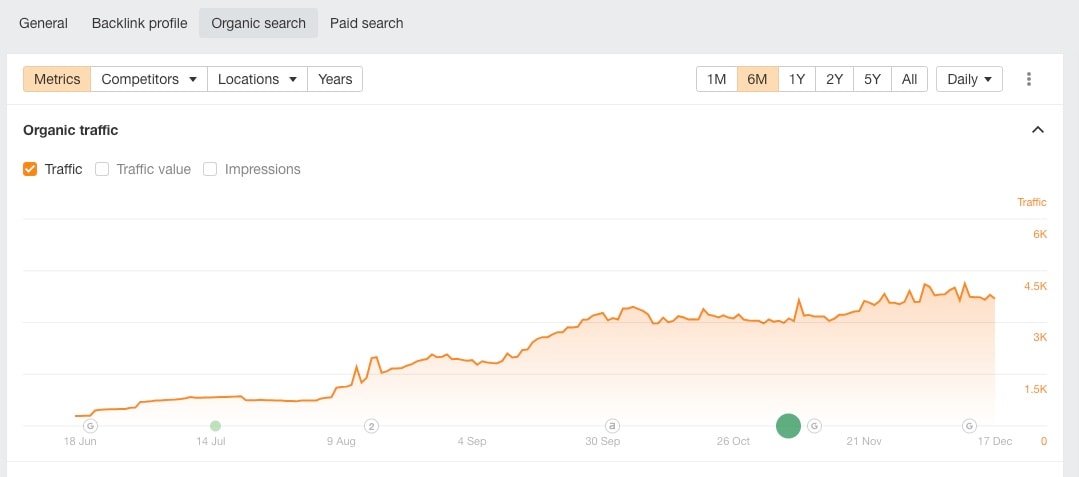Real Estate Link Building For Investors, Brokers, And Multi-Market Brands
Real estate is one of the most competitive local SEO categories. You are competing against Zillow, Redfin, Homes.com, national brokerages, and lead aggregators that constantly publish and earn thousands of links.
Most real estate link building advice is written for beginners or low-volume agents. The strategies in this guide are built for companies that operate across multiple markets, investors who need consistent, motivated seller leads, proptech platforms competing for national queries, and brokerages that want to outperform established competitors in search.
Stellar SEO has worked across these categories for more than a decade, running link building campaigns in some of the country’s toughest real estate markets. The approach in this guide is built on real-world testing and more than 25,000 links built across competitive verticals, including real estate, finance, and legal.
To win in this space, you need a link building company that can create authority, reinforce your entity signals, and secure high-quality backlinks that move rankings in tough markets.
Here are the best real estate link building services for real estate investors, proptech platforms, real estate SaaS companies, brokerages, and established real estate professionals who rely on SEO for deal flow and revenue.
Best Real Estate Link Building Services And Agencies
The agencies below were selected for their experience with real estate SEO, their ability to build high-quality backlinks at scale, and their track records in competitive verticals such as investors, proptech, and real estate SaaS.
| Agency | Best For | Key Strengths |
|---|---|---|
| Stellar SEO | Real estate investors, cash buyers, proptech platforms, and established brokerages | Manual outreach, high authority links, entity alignment, custom campaign design |
| Editorial.Link | Real estate marketplaces, large SaaS, PR-driven campaigns | Digital PR, fast delivery, strong editorial placements |
| Siege Media | Mature real estate brands with heavy content budgets | Asset-driven links, data reports, and content engines |
| Linkbuilder.io | Growth-stage real estate SaaS and CRMs | Competitor gap analysis, structured outreach |
| INSERT.LINK | Agencies handling multiple local markets | Affordable niche edits at scale |
Detailed Breakdown Of The Best Real Estate Link Building Agencies
Each of these providers brings different strengths. The gap between average and elite performance in real estate SEO often comes down to the ability to align backlinks, citations, brand mentions, local relevance, and structured entity signals.
This is the foundation of our Authority Signal Framework. When these elements reinforce one another, search engines learn exactly who you are, what markets you serve, and why your brand deserves stronger placement than competing real estate professionals.
With this context in mind, here is how the top agencies compare.

1. Stellar SEO – Best Real Estate Link Building Service for Investors, Proptech, and Brokerages
Stellar SEO is the top choice for serious real estate operators who need more than generic link packages. Real estate investors, cash home buyers, land investors, real estate SaaS, proptech platforms, and established brokerages work with Stellar SEO because the campaigns are built for competitive markets, not for low-budget hobbyists.
Our approach focuses on:
• Manual outreach that avoids link farms, marketplaces, and PBNs
• Entity-aligned link acquisition that reinforces your real estate brand across search engines
• Authority Signal Framework to combine backlinks, citations, mentions, and structured signals
• Custom campaigns for investors, proptech platforms, and multi-market real estate organizations
• High-quality backlinks from law, finance, housing, business, and local authority sources
We don’t work with agents looking for $50 backlinks or shortcut tactics. Our campaigns are built for companies with real revenue goals, multi-channel lead flow, and established brands competing for high-intent search terms.
Ideal for:
Real estate investors, cash buyers, wholesalers, land investors, proptech SaaS, mortgage-adjacent platforms, institutional buyers, regional brokerages, and companies operating in multiple markets.
2. Editorial.Link – Best for Companies Needing Digital PR
Editorial. Link performs well for real estate marketplaces, established real estate SaaS companies, and brands needing digital PR without long-term retainers. Their strength lies in landing fast editorial placements on high-authority websites that do not openly sell links.
Strengths:
• High authority editorial links
• Pay-as-you-go model
• Placement replacement guarantees
• Zero commitment structure
Ideal for:
Real estate marketplaces, rental platforms, property management SaaS, and mid-size real estate brands looking for quick authority boosts.
3. Siege Media – Best for Established Brands With Big Content Budgets
Siege Media is a content-first link building agency. They create assets like data studies, visual reports, and industry guides that naturally attract backlinks. Their investment level is higher than most agencies, but their work helps large brands produce links at scale.
Strengths:
• Data-driven linkable assets
• Well-known PR processes
• Large content libraries that support ongoing link earning
Ideal for:
Large brokerages, real estate SaaS with content budgets over $20k per month, and brands competing nationally.
4. Linkbuilder.io – Best for SaaS Companies Scaling Fast
Linkbuilder.io is a structured link building partner built for growth-stage companies. With strong processes and predictable delivery, they are a good fit for SaaS platforms in the real estate space that need consistent link velocity.
Strengths:
• Competitor backlink gap analysis
• White-hat outreach with detailed reporting
• Tiered link packages
Ideal for:
Real estate CRM platforms, transaction management SaaS, proptech applications, and real estate marketplaces.
5. INSERT.LINK – Best for Agencies Managing Multiple Real Estate Clients
INSERT.LINK is not a managed link building service but a marketplace where buyers select pre-approved sites for niche edits. It can work for agencies with many small real estate clients because it offers control and predictable pricing.
Strengths:
• Large inventory of real estate-relevant domains
• DR and traffic filtering
• Instant turnaround
• Affordable placement pricing
Ideal for:
Agencies managing multiple real estate sites in local markets, freelancers, small brokerages, and early-stage real estate websites that need basic authority.
Case Study 1: Real Estate Investor in Dallas
A Dallas-based real estate investor operating across multiple DFW submarkets came to us after seeing monthly organic visits drop to under 200 following a penalty. Their existing backlink profile included local business listings, low-quality links, and outdated guest posts that no longer supported growth in rankings. They needed stronger authority for terms related to selling houses fast, inherited properties, probate homes, and off-market real estate.
We executed a targeted link building campaign focused on:
• High-quality backlinks from housing, finance, investing, and legal sites
• Geo-relevant Dallas, Fort Worth, and North Texas business and media outlets
• Topical authority development around real estate investing, inherited properties, and distressed property solutions
• Structured entity reinforcement across local directories, internal links, and brand mentions

The result was an increase in monthly organic traffic from under 200 visits to more than 4,500 within 12 months. High-intent leads grew by 71 percent from organic search. Most importantly, the campaign helped them outrank national iBuyer competitors for localized queries by strengthening authority in the Dallas market rather than chasing broad national terms.
Case Study 2: Proptech Platform Needing Stronger National Visibility
A mid-stage proptech company offering marketplace tools for rental property owners and investors needed high-authority backlinks to compete against entrenched brands. Despite strong product-market fit, their content lacked authority and struggled to gain exposure across national transactional keywords.
We built a campaign around:
• High DR editorial backlinks from business, SaaS, and proptech publications
• Real estate investing communities, landlord education websites, and rental market data blogs
• Linkable assets, including market reports and investor resources
• Entity consolidation across social profiles and partner sites
Within four months, they secured multiple top-10 rankings for property-investing and rental-marketplace terms. Referral traffic increased by more than 50 percent due to high-authority placements. This positioned them as a trusted technology brand rather than another startup fighting for attention.
A strong partner can accelerate growth, but even the best real estate link building agency cannot replace a solid understanding of how link building works at a strategic level.
The right provider gives you authority, links, and support. However, your long-term success still depends on how well your real estate website reinforces entity signals, targets your local market, and earns relevance through consistent content and strategic outreach.
With the agency landscape in mind, the next step is to understand the real estate link building strategies that actually drive rankings, improve local search performance, and help serious operators outperform national competitors.
Why High Quality Backlinks Matter in Real Estate
Search engines evaluate real estate websites through a lens of expertise, authority, and local credibility. Real estate SEO is about ranking pages, building a consistent signal pattern across your backlinks, internal links, citations, and third-party references that makes your brand the dominant entity for specific topics and markets.
When your backlink profile is aligned with your real estate niche, your target audience, your markets, and your brand positioning, search engines can index and rank your content with confidence.
What Makes a High Quality Real Estate Backlink
A high-quality backlink improves authority, matches your niche, and reinforces your entity signals. When evaluating link targets, focus on:
• Domain authority and domain rating
• Real traffic and real audience engagement
• Strong editorial standards
• Clean outbound link profile with no spam categories
• Real relevance to the real estate industry, your local market, or your audience
• Content quality that encourages search engines to trust and index the page
Not all backlinks benefit your real estate business. Search engines evaluate authority by reviewing the relevance of linking websites, the context of the mentions, and the consistency of signals across your online presence.
High-quality backlinks for real estate websites typically come from housing authorities, local media outlets, industry-specific directories, finance blogs, neighborhood websites, property management platforms, or trusted local organizations. These links reinforce your brand as a legitimate entity in your real estate market and strengthen your visibility across search engines and AI systems.
Real Estate Link Building Strategies That Work Today
Below are field-tested link-building strategies used to help real estate sites earn high-quality backlinks, strengthen authority signals, and drive more traffic from search engines.
Each tactic must tie back to your Authority Signal Framework. Backlinks alone are not enough. The most successful real estate SEO campaigns connect backlinks to local citations, internal links, structured data, long-form assets, and brand mentions.
This alignment allows search engines to understand your real estate business at the entity level, which improves rankings for neighborhoods, property types, geographic areas, and real estate niches.
1. Build Real Estate Backlinks Through Your Existing Local Network
Real estate professionals already work with businesses that can provide valuable links. These include lenders, title companies, inspectors, staging companies, local photographers, moving companies, local chamber groups, and local organizations. These relationships allow you to build links quickly because trust already exists.
Create a targeted list of businesses you partner with in your real estate market. Many have websites that feature local partners, resources, or preferred vendors. Ask if they accept resource submissions, guest posting, or regional business listings. These are easy wins that improve local search rankings and strengthen geo-relevance.
2. Analyze Competitor Backlinks to Reverse Engineer What Works
Every real estate market has dominant competitors. Their backlink profiles reveal which websites in your area link to real estate sites, which link building strategies work, and which link opportunities are available.
Use competitor backlink analysis to identify:
• Industry-specific directories that matter
• Local news sources that cover your market
• Community websites that link to real estate content
• Local events or sponsorship opportunities
• Real estate blogs that accept guest posting
• Editorial placements that drive referral traffic
Build a list of the best competitor links and recreate the ones that are relevant to your real estate niche. This eliminates guesswork and helps you move faster.
3. Improve and Expand Your Existing Backlink Profile
Real estate websites often earn links naturally from lenders, brokers, financial blogs, and local websites. Review your Google Search Console and analytics data to identify where your referral traffic comes from. These websites are ideal partners for additional link building because they already trust your content.
Reach out and offer to create updated resources, neighborhood guides, or guest content. Fix any broken links and provide improved replacement content. This helps you build relationships and recover link equity you may be missing.
4. Create Content That Naturally Attracts Relevant Backlinks
Content plays a significant role in real estate link building. Journalists, bloggers, and local websites need authoritative information. Create content that solves problems for buyers, sellers, investors, and residents.
Strong examples include:
• Local market reports
• Neighborhood guides
• Community event guides
• Real estate investing education
• Current market trends
• Local SEO style guides on property taxes, zoning, or school districts
This type of content earns backlinks from community websites, real estate blogs, local outlets, and people researching properties online. It also helps you build relationships with local organizations.
5. Use Guest Posting to Build High Quality Backlinks and Authority
Guest posting remains a powerful link building strategy for the real estate industry. When you create valuable content for industry websites, lifestyle magazines, local newspapers, finance blogs, or home improvement sites, you control the narrative and earn relevant backlinks.
Guest posting is effective because:
• You choose topics that match your target audience
• You can position your real estate agency as an expert
• You earn genuine editorial backlinks
• You reach residents and seasoned property seekers
• You strengthen the context search engines associate with your brand
Guest posting works well for real estate agents, real estate investors, brokerages, and property managers looking to increase search engine visibility.
6. Create Geo-Targeted Real Estate Content That Earns Local Backlinks
Geo-targeted content attracts links from residents, local businesses, and community websites. It also increases your topical authority for local search results.
Examples include:
• Guides to local neighborhoods
• Restaurant, park, school, and area attraction guides
• Local festivals and community event resources
• New property listings and local market trends
• Local business roundups
• Local resident resources
This strategy helps you earn links from local websites, local directories, and news outlets. Internal links strengthen your site structure, and your content becomes a hub for local search rankings.
7. Start Small, Build Relationships, and Scale Your Link Building Campaign
Real estate link building is most effective when you focus on a small number of highly relevant targets. Build relationships with complementary businesses, local organizations, industry websites, and community platforms.
Examples:
• Partner with mortgage brokers and insurance providers
• Collaborate with home improvement businesses
• Sponsor local events that provide business listings and local citations
• Work with local photographers and videographers
• Participate in local events and reach out to media covering those events
These relationships help you earn more links, increase referral traffic, and improve your website’s authority.
How Many Backlinks Does a Real Estate Website Need?
There is no universal number. Every market is different. A real estate website competing in Austin needs more authority than one in a smaller town. The key is consistent link building efforts and a plan that reinforces your real estate entity signals, content relevance, and local SEO strategy.
Aim for a steady link building campaign built on quality, not quantity. A small number of relevant backlinks improves search rankings more than a large number of low-quality links.
Build a Strategy That Supports Long-Term Growth
Real estate SEO requires strong foundational content, cleaned-up internal links, and a consistent, safe link-building strategy. Many real estate agencies begin link building internally but later work with an experienced partner to scale outreach, build relationships, and manage campaigns across multiple markets.
A reputable link building company helps you earn more links, build authority faster, and compete against larger real estate sites without unnecessary risk.
FAQs
How does link building help investors and cash buyers rank for motivated seller keywords?
Real estate investors and cash buyers compete in markets dominated by large aggregators and national lead companies. High-quality backlinks from housing, finance, legal, and local authority sites increase topical relevance and signal to search engines that your brand is a credible entity for queries related to inherited homes, probate properties, distressed sellers, and off-market deals.
These signals help you win local rankings for high-intent, motivated seller searches in both large and mid-size metros.
What types of backlinks strengthen entity signals for real estate businesses?
Backlinks from trusted sources such as housing authorities, local business groups, neighborhood websites, real estate industry directories, regional news outlets, and finance or legal publications reinforce your real estate brand’s core identity.
When those links match your markets and services, search engines can confidently map your entity to specific neighborhoods, property types, and real estate categories.
How can proptech and real estate SaaS companies earn high authority links without relying on PR-only campaigns?
Proptech platforms can earn authoritative backlinks by publishing market data, investor resources, rental trend reports, and educational content that industry publishers actively need.
These linkable assets gain traction through targeted outreach to business, SaaS, real estate investing, and landlord education sites. Pairing these placements with consistent entity signals across profiles, partnerships, and social channels strengthens national visibility and improves rankings for competitive software terms.
How long does it take to see ranking improvements from a real estate link building campaign?
Most real estate websites see ranking movement within 60 to 120 days once high-quality backlinks begin reinforcing local relevance, brand identity, and topical authority.
Competitive markets like Dallas, Phoenix, and Atlanta require more time and additional authority building. Steady acquisition of relevant links, consistent internal linking, and structured entity signals drive long-term ranking improvements across neighborhoods, property types, and real estate transaction categories.













